Unit 7 Will people have robots Section A(1a-2d) 原创教学课件(共54张PPT)
文档属性
| 名称 | Unit 7 Will people have robots Section A(1a-2d) 原创教学课件(共54张PPT) | 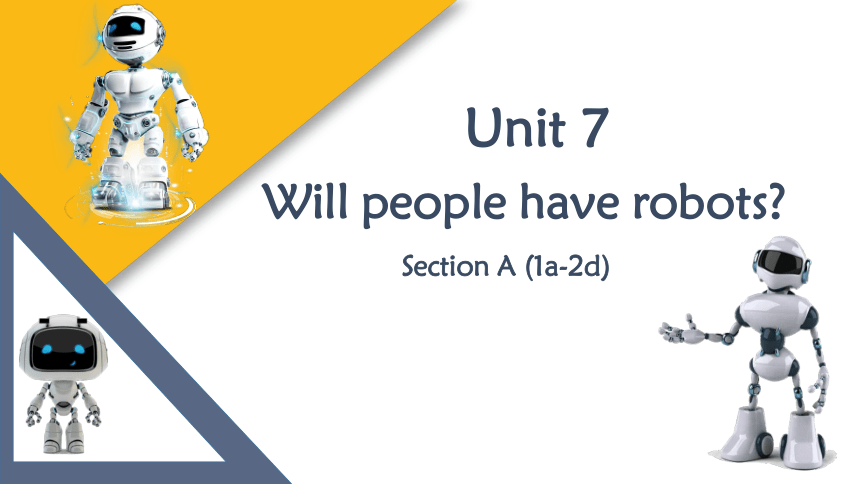 | |
| 格式 | pptx | ||
| 文件大小 | 48.8MB | ||
| 资源类型 | 试卷 | ||
| 版本资源 | 人教新目标(Go for it)版 | ||
| 科目 | 英语 | ||
| 更新时间 | 2022-11-09 16:17:04 | ||
图片预览

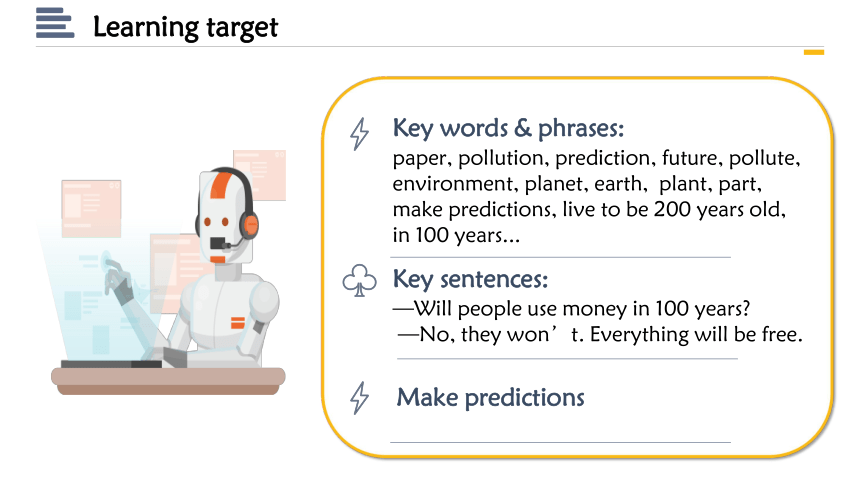
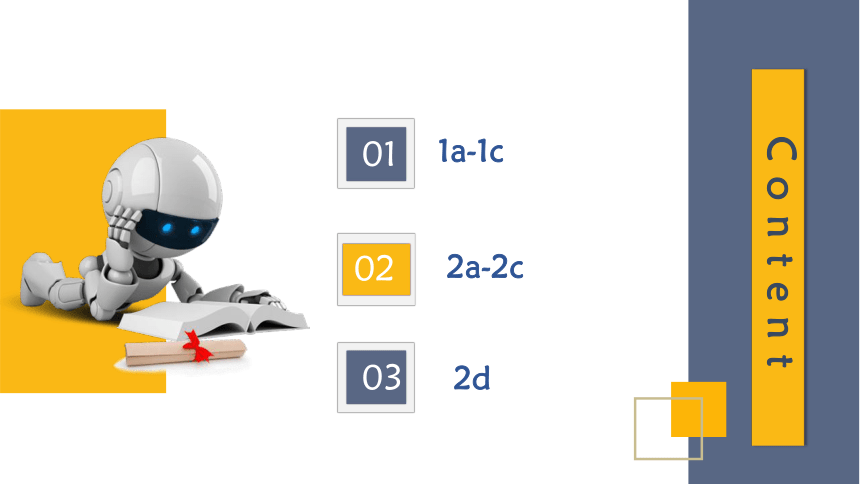
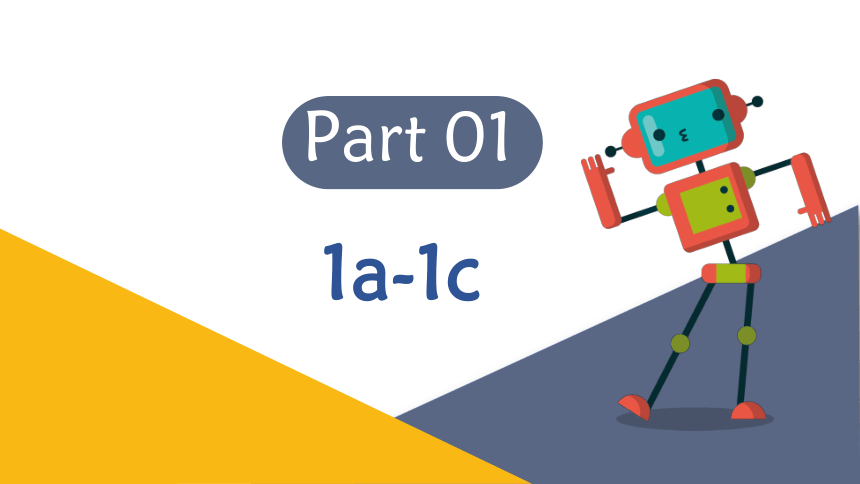
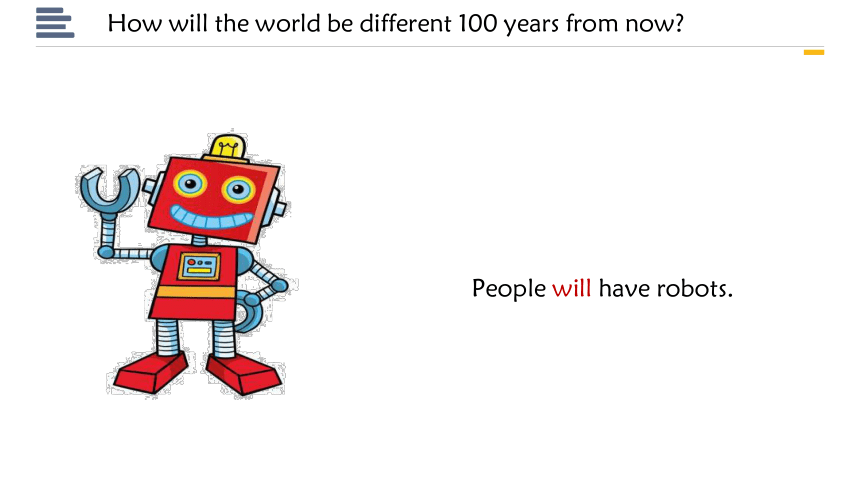
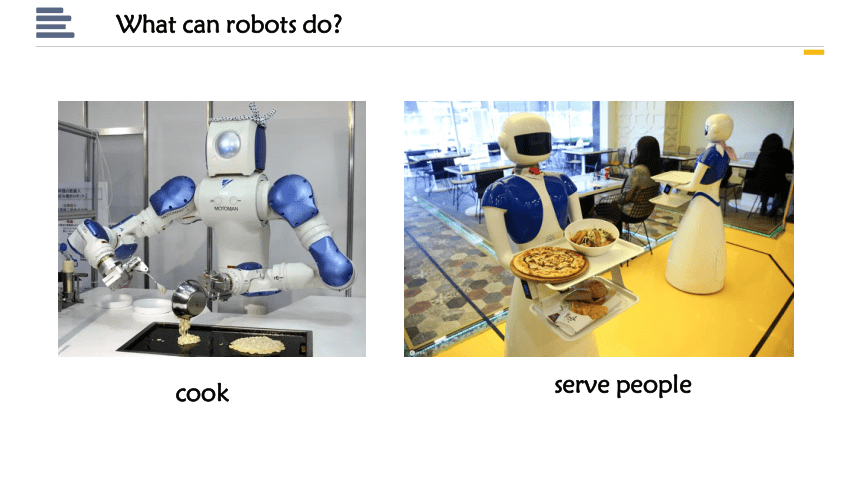
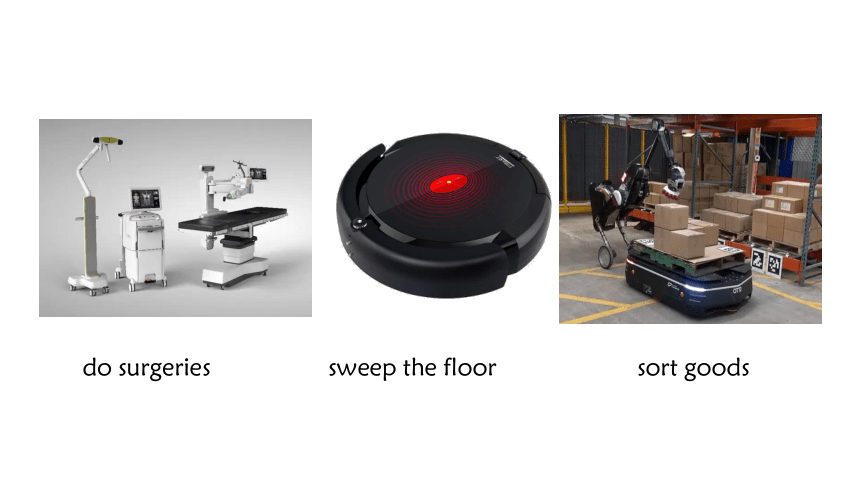
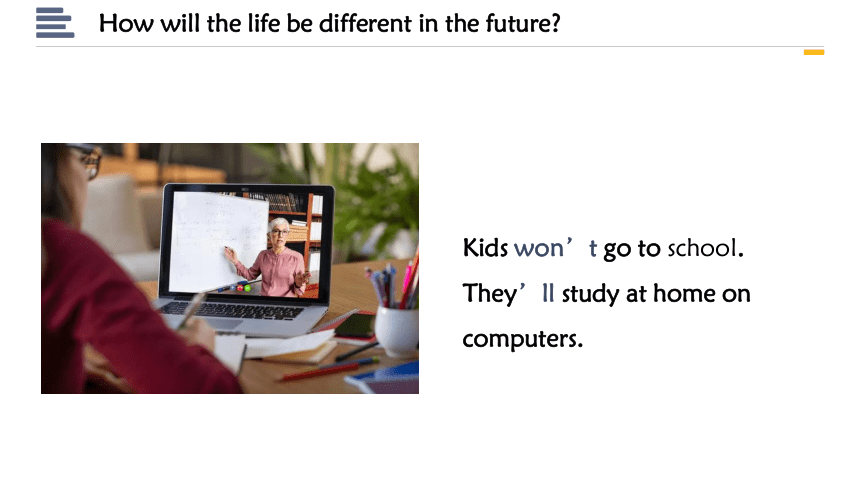
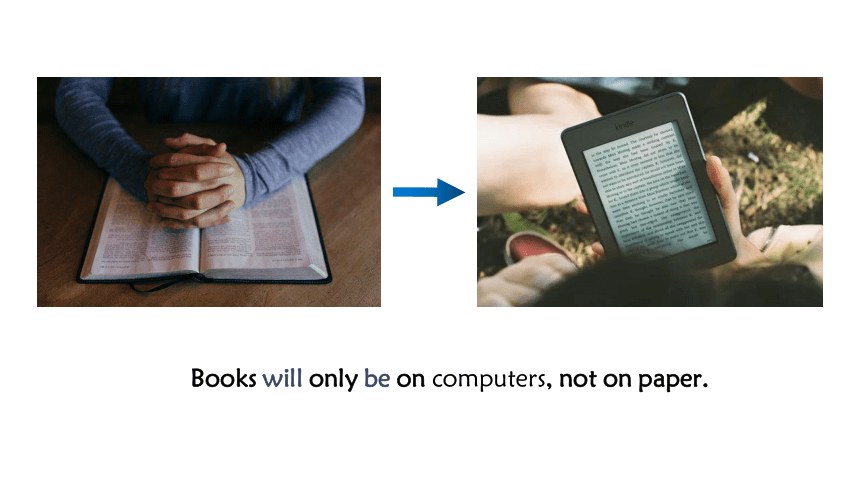
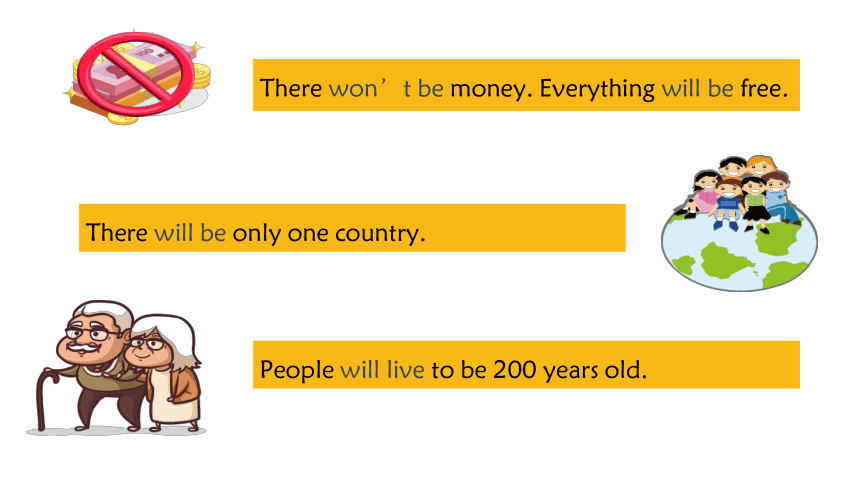
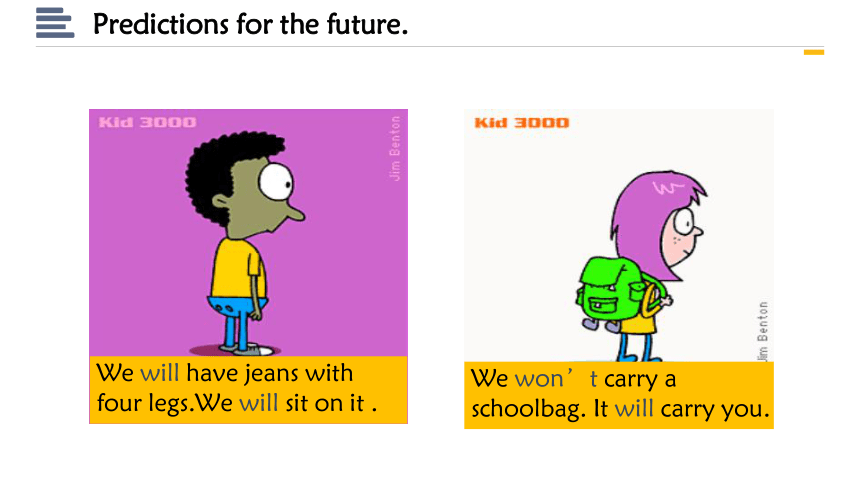
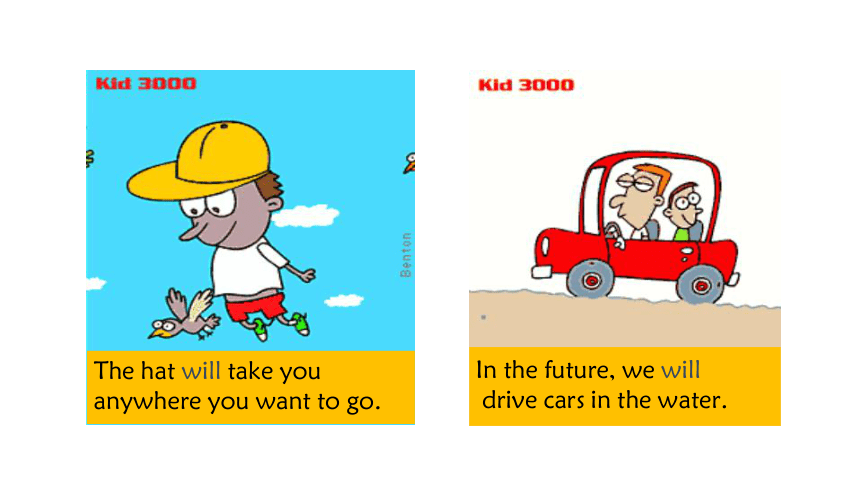
文档简介
(共54张PPT)
Will people have robots
Unit 7
Section A (1a-2d)
Key words & phrases:
paper, pollution, prediction, future, pollute,
environment, planet, earth, plant, part, make predictions, live to be 200 years old, in 100 years...
Learning target
Key sentences:
—Will people use money in 100 years
—No, they won’t. Everything will be free.
Make predictions
01
1a-1c
2a-2c
2d
Content
02
03
Part 01
1a-1c
How will the world be different 100 years from now
People will have robots.
What can robots do
cook
serve people
do surgeries
sweep the floor
sort goods
How will the life be different in the future
Kids won’t go to school. They’ll study at home on computers.
Books will only be on computers, not on paper.
There won’t be money. Everything will be free.
There will be only one country.
People will live to be 200 years old.
Predictions for the future.
a
g
d
b
c
i
j
f
h
We will have jeans with four legs.We will sit on it .
We won’t carry a schoolbag. It will carry you.
The hat will take you
anywhere you want to go.
In the future, we will
drive cars in the water.
The pencil will help us to fill
in the right answers.
In the future, we will turn
on the day.
Free Talk
a
g
d
b
c
i
j
f
h
Do you think the predictions for the future will come true
What other predictions about the future can you make
Lead in
a
g
d
b
c
i
j
f
h
1.Where are the two boys
2.What are they talking about
4.Do you think these situations(robot helping us at home; studying math on computer ) are happening now or will happen in the future
3.Can you describe the two small pictures
1a How will the world be different 100 years from now Read these predictions. Check (√) A for agree or D for Disagree.
a
g
d
b
c
i
j
f
h
____ A ____ D 1. People will have robots in their homes.
____ A ____ D 2. People won’t use money. Everything will be free.
____ A ____ D 3. Books will only be on computers, not on paper.
____ A ____ D 4. Kids won’t go to school. They’ll study at home on
computers.
____ A ____ D 5. There will be only one country.
____ A ____ D 6. People will live to be 200 years old.
1b Listen and circle the predictions you hear in 1a.
a
g
d
b
c
i
j
f
h
People will have robots in their homes.
People won’t use money. Everything will be free.
Books will only be on computers, not on paper.
Kids won’t go to school. They’ll study at home on computers.
There will only be one country.
People will live to be 200 years old.
live to (be) + 年龄 活到……岁
Listen again and complete the conversation.
a
g
d
b
c
i
j
f
h
A: Do you _____ people will ____ ______ in their homes in 100 _____
B: Yes, I do. I saw a robot on TV, and it ______ the kitchen.
A: Well, I don’t think people ___ ___ money.
B: Do you think everything will __ ____
A: Yeah, ________.
B: I think there will be ____ one ________.
A: Only one _______ in the world
Will there ___ world _____
B: I _____ so.
A: I _____ kids _____ go to school. They will _____ at home on _________.
B: Oh, I ________.
A: You do
B: Yeah, there will ______ be schools.
think
have robots
years
cleaned
will use
be free
probably
only
country
country
be
peace
hope
think
won’t
study
computers
disagree
always
1b Ask and answer questions about the predictions in 1a.
a
g
d
b
c
i
j
f
h
Will people use money in 100 years
No, they won’t. Everything will be free.Will people live to be 200 years old
Yes, they will / I hope so.
Fill the conversations.
a
g
d
b
c
i
j
f
h
A:____ people ______robots in their homes in 100 years
B:Yes, _____ _____.
Will
have
they will
A:____ kids go to school
B:No, _____ _____.They_____ study at home on computers.
Will
they won't
will
A:____ ______ ____only one country in the future
B:No, _____ _____.
Will there be
there won’t
A:____ _____ ____ world peace
B:Yes, _____ _____.
Will there be
there will
Free talk.
a
g
d
b
c
i
j
f
h
Make more predictions about the future.
What will cars be like
What will cities be like
作不可数名词,表示“一张纸”要用 a piece of paper, 多于一张纸要用“基数词+pieces of paper”表示。
eg.There are two pieces of paper on the desk.
Language point
1. Books will only be on computers, not on paper.
作可数名词,意为“报纸;论文;试卷”等。
eg.I finish many papers every day.
in + 时间段 在……之后
通常用于一般将来时,对其提问要用
how soon。
— How soon will he come back
— In 20 minutes.
2. Will people use money in 100 years
will + 动词原形表将来
(1)一般将来时的一般疑问句,
其结构为Will+主语+动词原形+其他?
eg.Will Lisa come back soon?
3. Will people use money in 100 years
(2)一般将来时的肯定句结构:主语+will +动词原形+其他?
eg. Lisa will come back soon.
(3)一般将来时的否定句结构:主语+won’t +动词原形+其他?
eg. Lisa won’t come back soon.
there be 句型一般将来时
肯定句: There will be +名词(短语)
There will be fewer animals in the world.
否定句: There will not / won’t be +名词(短语)
There won’t be fewer animals in the world.
01
4. there will be only one country.
02
03
一般疑问句:
— Will there be +名词(短语)
— Yes, there will. / No, there won’t.
Exercise
一.单项选择。
1. ______ you _______ your winter holiday next week
A. Do; have B. Will ; have C. Are; had D. Are; have
2. —When _____ you ____ to Australia
—Next Monday.
A. did, fly B. will, fly C. are, fly D. do, fly
3. Which team ________ the next football match
A. wins B. won C. will win D. win
B
B
C
a
g
d
b
c
i
j
f
h
二.根据要求完成句子。
1. Tony will go to cinema tonight.(对画线部分提问)
_________ _________Tony_________ tonight
2. I think Sally will be a doctor in five years.(对画线部分提问)
_________ ___________ you think Sally __________ ___________ in five years
3. There will be fewer people in 100 years.(改为一般疑问句)
___________ there ____ fewer people in 100 years
4. There won’t be any paper money. (改为同义句)
There will be ______ __________money.
What
will
will
be
What
do
do
Will
be
no
paper
Part 02
2a-2c
Revision
a
g
d
b
c
i
j
f
h
Predictions about future.
People will have robots in their homes.
People won’t use money. Everything will be free.
People will live to be 200 years old.
a
g
d
b
c
i
j
f
h
Books will only be on computers, not on paper .
Kids won’t go to school. They’ll study at home on computers.
There will be only one country.
a
g
d
b
c
i
j
f
h
More predictions
Will there be more or less pollution Why
People pollute the water, the air and so on.
The environment is always polluted.
water pollution
air pollution
white pollution
light pollution
a
g
d
b
c
i
j
f
h
Free talk
plant more trees
use less water
take the bus more
use fewer plastic bags
...
What should we do now to protect our environment
a
g
d
b
c
i
j
f
h
2a Listen and circle the words you hear.
1. There will be (more / less / fewer) people.
2. There will be (more / less / fewer) free time.
3. There will be (more / less / fewer) cars.
4. There will be (more / less / fewer) pollution.
5. There will be (more / less / fewer) trees.
a
i
j
h
1. There will be more people.
2. There will be less free time.
3. There will be fewer cars.
4. There will be less pollution.
5. There will be fewer trees.
there be结构在一般将来时中的运用
There will be + more/less/fewer+名词
more+可数名词或不可数名词
less+不可数名词
fewer+可数名词
都表示同类事物的比较
Language point
a
g
d
b
c
i
j
f
h
2a Listen again. Check (√) the predictions you hear.
_____ 1. There will be fewer people.
_____ 2. There will be less free time.
_____ 3. People will use the subways less.
_____ 4. There will be more pollution.
_____ 5. Cities will be very big and crowded.
√
√
a
g
d
b
c
i
j
f
h
Listen again, write T for true, F for false.
1.Here are some students' predictions about the future. ( )
2.There will be more cars and subways because of more people. ( )
3.Less pollution will be good for the earth. ( )
4.Countries will be big and crowded because there will be a lot more people. ( )
T
T
F
F
a
g
d
b
c
i
j
f
h
2c Make conversations about the predictions in 2a and 2b.
What’s your prediction about the future
I think there will be more pollution.
Really I don’t think so. But I think there will be fewer trees.
a
g
d
b
c
i
j
f
h
more / fewer tall buildings
more / fewer cars
more people and more crowded
less/more free time
less / more pollution
fewer / more trees
Part 03
2d
a
g
d
b
c
i
j
f
h
Read the conversation in 2d and answer the questions below.
What is Jill reading
2) What will the future be like according to the book
3) What can people do to save the earth
a
g
d
b
c
i
j
f
h
Nick: What are you reading, Jill
Jill: It’s a book about the future.
Nick: Sounds cool. So what will the future be like
Jill: Well, cities will be more crowded and polluted.
There will be fewer trees and the environment
will be in great danger.
Nick: That sounds bad! Will we have
to move to other planets
Jill: Maybe. But I want to live on the earth.
Nick: Me, too. Then what can we do
Jill: We can use less water and plant more trees.
Everyone should play a part in saving the earth.
a
g
d
b
c
i
j
f
h
Read the conversation in 2d and answer the questions below.
What is Jill reading
2) What will the future be like according to the book
3) What can people do to save the earth
He’s reading a book about the future.
Cities will be more crowded and polluted.
There will be fewer trees and the environment will be in great danger.
We can use less water and plant more trees.
Everyone should play a part in saving the earth.
2d Role-play the conversation.
a
g
d
b
c
i
j
f
h
Nick: What are you reading, Jill
Jill: It’s a book about the future.
Nick: Sounds cool. So what will the future be like
Jill: Well, cities will be more crowded and polluted.
There will be fewer trees and the environment
will be in great danger.
Nick: That sounds bad! Will we have
to move to other planets
Jill: Maybe. But I want to live on the earth.
Nick: Me, too. Then what can we do
Jill: We can use less water and plant more trees.
Everyone should play a part in saving the earth.
Fill in the blanks according to the conversation.
f
Jill is reading a book about the future. Can you
imagine what ____ the future ____ like Cities _____ ___
more crowded and polluted. There ___ ___ fewer trees
and the environment ___ ___ in great danger.
_____ we _____ ___ move to other planets What can we
do to live on the earth We can use ___ water and plant
____ trees. Everyone should _____ ___ ______ ___ saving
the earth.
will
be
will
be
will
be
will
be
Will
have
to
play
part
in
less
more
a
g
d
b
c
i
j
f
h
Language point
1.It’s a book about the future.
future 名词,意为将来;未来。
① in the future多指较遥远的将来的某一时间,在时间概念上一般不包括现在。
例:My sister wants to be an actress in the future.我妹妹将来想当演员。
② in future多指从现在算起的近期的将来,在时间上包括现在。
例:You must be more careful in future.
你今后必须更加小心。
a
g
d
b
c
i
j
f
h
2.So what will the future be like?
用于询问某人或某物将来的状态或性质,相当于“How+will+主语+be?”,意为“…将会是什么样呢?”
What will the weather be like tomorrow?
=How will the weather be tomorrow?
明天天气怎么样呢?
What will...look like?用来询问人的外貌或物品的外形。 “…看起来将是什么样?”
① fewer 较少的、更少的,是few的比较级,修饰可数名词的复数。
例:My friend has fewer apples than I have.
我朋友的苹果比我的少。
② less 较少的、更少的,是little的比较级,修饰不可数名词。
例:I have less money in my bag. 我包里的钱更少了。
③ more 更多的,是many和much的比较级,既可修饰可数名词复数,也可修饰不可数名词。
例:There is more water in this bottle.这个瓶子里的水更多。
01
02
03
3.There will be fewer trees and the environment will be in great danger.
a
g
d
b
c
i
j
f
h
4. Everyone should play a part in saving the earth.
play a part 参与;发挥作用
play a part常与介词in连用,后接名词、代词或动词-ing形式。
eg.Why not play a part in their discussion
earth 表示世界上独一无二的事物,因此其前一般要加定冠词the。
The earth goes around the sun. 地球绕着太阳转。
5. Everyone should play a part in saving the earth.
earth n. 地球;世界
Exercise
一.用much,many,more,less,few或fewer填空。
1. Last year I spent ________ time in playing basketball because I had to study hard.
2. I hope we will have ________ homework and _______ free time next year.
3. Our city will become ________ beautiful. I think there will be ________ tall buildings and ________ pollution in it.
4. Every day mother always has ________ housework to do.
5. How ________ sisters do you have
6. ________ people like to live in a polluted place.
7. I’ll use ________ plastic bags to reduce white pollution.
8. There’s _________ milk in this bottle than in that one.
less
less
more
more
more
less
much
many
Few
fewer
more / less
二.完成句子
1. The kids will have a party next week.(改为否定句)
The kids _____ _____ a party next week.
2. He read an article by Han Han last month.(用next month改写句子)
He_____ _____ an article by Han Han next month.
3. My cousin will arrive in 2 days.(对画线部分提问)
_____ _____ _____ your cousin ________
4. How will the future be (改为同义句)
_____ will the future be _____
won’t have
will read
How soon will
arrive
What like
Homework
Make predictions about yourself in 10 years.
Write down 5 sentences.
Revise the key words and phrases.
Preview the grammar– Simple future tense
(一般将来时)
Will people have robots
Unit 7
Section A (Gf-3c)
Will people have robots
Unit 7
Section A (1a-2d)
Key words & phrases:
paper, pollution, prediction, future, pollute,
environment, planet, earth, plant, part, make predictions, live to be 200 years old, in 100 years...
Learning target
Key sentences:
—Will people use money in 100 years
—No, they won’t. Everything will be free.
Make predictions
01
1a-1c
2a-2c
2d
Content
02
03
Part 01
1a-1c
How will the world be different 100 years from now
People will have robots.
What can robots do
cook
serve people
do surgeries
sweep the floor
sort goods
How will the life be different in the future
Kids won’t go to school. They’ll study at home on computers.
Books will only be on computers, not on paper.
There won’t be money. Everything will be free.
There will be only one country.
People will live to be 200 years old.
Predictions for the future.
a
g
d
b
c
i
j
f
h
We will have jeans with four legs.We will sit on it .
We won’t carry a schoolbag. It will carry you.
The hat will take you
anywhere you want to go.
In the future, we will
drive cars in the water.
The pencil will help us to fill
in the right answers.
In the future, we will turn
on the day.
Free Talk
a
g
d
b
c
i
j
f
h
Do you think the predictions for the future will come true
What other predictions about the future can you make
Lead in
a
g
d
b
c
i
j
f
h
1.Where are the two boys
2.What are they talking about
4.Do you think these situations(robot helping us at home; studying math on computer ) are happening now or will happen in the future
3.Can you describe the two small pictures
1a How will the world be different 100 years from now Read these predictions. Check (√) A for agree or D for Disagree.
a
g
d
b
c
i
j
f
h
____ A ____ D 1. People will have robots in their homes.
____ A ____ D 2. People won’t use money. Everything will be free.
____ A ____ D 3. Books will only be on computers, not on paper.
____ A ____ D 4. Kids won’t go to school. They’ll study at home on
computers.
____ A ____ D 5. There will be only one country.
____ A ____ D 6. People will live to be 200 years old.
1b Listen and circle the predictions you hear in 1a.
a
g
d
b
c
i
j
f
h
People will have robots in their homes.
People won’t use money. Everything will be free.
Books will only be on computers, not on paper.
Kids won’t go to school. They’ll study at home on computers.
There will only be one country.
People will live to be 200 years old.
live to (be) + 年龄 活到……岁
Listen again and complete the conversation.
a
g
d
b
c
i
j
f
h
A: Do you _____ people will ____ ______ in their homes in 100 _____
B: Yes, I do. I saw a robot on TV, and it ______ the kitchen.
A: Well, I don’t think people ___ ___ money.
B: Do you think everything will __ ____
A: Yeah, ________.
B: I think there will be ____ one ________.
A: Only one _______ in the world
Will there ___ world _____
B: I _____ so.
A: I _____ kids _____ go to school. They will _____ at home on _________.
B: Oh, I ________.
A: You do
B: Yeah, there will ______ be schools.
think
have robots
years
cleaned
will use
be free
probably
only
country
country
be
peace
hope
think
won’t
study
computers
disagree
always
1b Ask and answer questions about the predictions in 1a.
a
g
d
b
c
i
j
f
h
Will people use money in 100 years
No, they won’t. Everything will be free.Will people live to be 200 years old
Yes, they will / I hope so.
Fill the conversations.
a
g
d
b
c
i
j
f
h
A:____ people ______robots in their homes in 100 years
B:Yes, _____ _____.
Will
have
they will
A:____ kids go to school
B:No, _____ _____.They_____ study at home on computers.
Will
they won't
will
A:____ ______ ____only one country in the future
B:No, _____ _____.
Will there be
there won’t
A:____ _____ ____ world peace
B:Yes, _____ _____.
Will there be
there will
Free talk.
a
g
d
b
c
i
j
f
h
Make more predictions about the future.
What will cars be like
What will cities be like
作不可数名词,表示“一张纸”要用 a piece of paper, 多于一张纸要用“基数词+pieces of paper”表示。
eg.There are two pieces of paper on the desk.
Language point
1. Books will only be on computers, not on paper.
作可数名词,意为“报纸;论文;试卷”等。
eg.I finish many papers every day.
in + 时间段 在……之后
通常用于一般将来时,对其提问要用
how soon。
— How soon will he come back
— In 20 minutes.
2. Will people use money in 100 years
will + 动词原形表将来
(1)一般将来时的一般疑问句,
其结构为Will+主语+动词原形+其他?
eg.Will Lisa come back soon?
3. Will people use money in 100 years
(2)一般将来时的肯定句结构:主语+will +动词原形+其他?
eg. Lisa will come back soon.
(3)一般将来时的否定句结构:主语+won’t +动词原形+其他?
eg. Lisa won’t come back soon.
there be 句型一般将来时
肯定句: There will be +名词(短语)
There will be fewer animals in the world.
否定句: There will not / won’t be +名词(短语)
There won’t be fewer animals in the world.
01
4. there will be only one country.
02
03
一般疑问句:
— Will there be +名词(短语)
— Yes, there will. / No, there won’t.
Exercise
一.单项选择。
1. ______ you _______ your winter holiday next week
A. Do; have B. Will ; have C. Are; had D. Are; have
2. —When _____ you ____ to Australia
—Next Monday.
A. did, fly B. will, fly C. are, fly D. do, fly
3. Which team ________ the next football match
A. wins B. won C. will win D. win
B
B
C
a
g
d
b
c
i
j
f
h
二.根据要求完成句子。
1. Tony will go to cinema tonight.(对画线部分提问)
_________ _________Tony_________ tonight
2. I think Sally will be a doctor in five years.(对画线部分提问)
_________ ___________ you think Sally __________ ___________ in five years
3. There will be fewer people in 100 years.(改为一般疑问句)
___________ there ____ fewer people in 100 years
4. There won’t be any paper money. (改为同义句)
There will be ______ __________money.
What
will
will
be
What
do
do
Will
be
no
paper
Part 02
2a-2c
Revision
a
g
d
b
c
i
j
f
h
Predictions about future.
People will have robots in their homes.
People won’t use money. Everything will be free.
People will live to be 200 years old.
a
g
d
b
c
i
j
f
h
Books will only be on computers, not on paper .
Kids won’t go to school. They’ll study at home on computers.
There will be only one country.
a
g
d
b
c
i
j
f
h
More predictions
Will there be more or less pollution Why
People pollute the water, the air and so on.
The environment is always polluted.
water pollution
air pollution
white pollution
light pollution
a
g
d
b
c
i
j
f
h
Free talk
plant more trees
use less water
take the bus more
use fewer plastic bags
...
What should we do now to protect our environment
a
g
d
b
c
i
j
f
h
2a Listen and circle the words you hear.
1. There will be (more / less / fewer) people.
2. There will be (more / less / fewer) free time.
3. There will be (more / less / fewer) cars.
4. There will be (more / less / fewer) pollution.
5. There will be (more / less / fewer) trees.
a
i
j
h
1. There will be more people.
2. There will be less free time.
3. There will be fewer cars.
4. There will be less pollution.
5. There will be fewer trees.
there be结构在一般将来时中的运用
There will be + more/less/fewer+名词
more+可数名词或不可数名词
less+不可数名词
fewer+可数名词
都表示同类事物的比较
Language point
a
g
d
b
c
i
j
f
h
2a Listen again. Check (√) the predictions you hear.
_____ 1. There will be fewer people.
_____ 2. There will be less free time.
_____ 3. People will use the subways less.
_____ 4. There will be more pollution.
_____ 5. Cities will be very big and crowded.
√
√
a
g
d
b
c
i
j
f
h
Listen again, write T for true, F for false.
1.Here are some students' predictions about the future. ( )
2.There will be more cars and subways because of more people. ( )
3.Less pollution will be good for the earth. ( )
4.Countries will be big and crowded because there will be a lot more people. ( )
T
T
F
F
a
g
d
b
c
i
j
f
h
2c Make conversations about the predictions in 2a and 2b.
What’s your prediction about the future
I think there will be more pollution.
Really I don’t think so. But I think there will be fewer trees.
a
g
d
b
c
i
j
f
h
more / fewer tall buildings
more / fewer cars
more people and more crowded
less/more free time
less / more pollution
fewer / more trees
Part 03
2d
a
g
d
b
c
i
j
f
h
Read the conversation in 2d and answer the questions below.
What is Jill reading
2) What will the future be like according to the book
3) What can people do to save the earth
a
g
d
b
c
i
j
f
h
Nick: What are you reading, Jill
Jill: It’s a book about the future.
Nick: Sounds cool. So what will the future be like
Jill: Well, cities will be more crowded and polluted.
There will be fewer trees and the environment
will be in great danger.
Nick: That sounds bad! Will we have
to move to other planets
Jill: Maybe. But I want to live on the earth.
Nick: Me, too. Then what can we do
Jill: We can use less water and plant more trees.
Everyone should play a part in saving the earth.
a
g
d
b
c
i
j
f
h
Read the conversation in 2d and answer the questions below.
What is Jill reading
2) What will the future be like according to the book
3) What can people do to save the earth
He’s reading a book about the future.
Cities will be more crowded and polluted.
There will be fewer trees and the environment will be in great danger.
We can use less water and plant more trees.
Everyone should play a part in saving the earth.
2d Role-play the conversation.
a
g
d
b
c
i
j
f
h
Nick: What are you reading, Jill
Jill: It’s a book about the future.
Nick: Sounds cool. So what will the future be like
Jill: Well, cities will be more crowded and polluted.
There will be fewer trees and the environment
will be in great danger.
Nick: That sounds bad! Will we have
to move to other planets
Jill: Maybe. But I want to live on the earth.
Nick: Me, too. Then what can we do
Jill: We can use less water and plant more trees.
Everyone should play a part in saving the earth.
Fill in the blanks according to the conversation.
f
Jill is reading a book about the future. Can you
imagine what ____ the future ____ like Cities _____ ___
more crowded and polluted. There ___ ___ fewer trees
and the environment ___ ___ in great danger.
_____ we _____ ___ move to other planets What can we
do to live on the earth We can use ___ water and plant
____ trees. Everyone should _____ ___ ______ ___ saving
the earth.
will
be
will
be
will
be
will
be
Will
have
to
play
part
in
less
more
a
g
d
b
c
i
j
f
h
Language point
1.It’s a book about the future.
future 名词,意为将来;未来。
① in the future多指较遥远的将来的某一时间,在时间概念上一般不包括现在。
例:My sister wants to be an actress in the future.我妹妹将来想当演员。
② in future多指从现在算起的近期的将来,在时间上包括现在。
例:You must be more careful in future.
你今后必须更加小心。
a
g
d
b
c
i
j
f
h
2.So what will the future be like?
用于询问某人或某物将来的状态或性质,相当于“How+will+主语+be?”,意为“…将会是什么样呢?”
What will the weather be like tomorrow?
=How will the weather be tomorrow?
明天天气怎么样呢?
What will...look like?用来询问人的外貌或物品的外形。 “…看起来将是什么样?”
① fewer 较少的、更少的,是few的比较级,修饰可数名词的复数。
例:My friend has fewer apples than I have.
我朋友的苹果比我的少。
② less 较少的、更少的,是little的比较级,修饰不可数名词。
例:I have less money in my bag. 我包里的钱更少了。
③ more 更多的,是many和much的比较级,既可修饰可数名词复数,也可修饰不可数名词。
例:There is more water in this bottle.这个瓶子里的水更多。
01
02
03
3.There will be fewer trees and the environment will be in great danger.
a
g
d
b
c
i
j
f
h
4. Everyone should play a part in saving the earth.
play a part 参与;发挥作用
play a part常与介词in连用,后接名词、代词或动词-ing形式。
eg.Why not play a part in their discussion
earth 表示世界上独一无二的事物,因此其前一般要加定冠词the。
The earth goes around the sun. 地球绕着太阳转。
5. Everyone should play a part in saving the earth.
earth n. 地球;世界
Exercise
一.用much,many,more,less,few或fewer填空。
1. Last year I spent ________ time in playing basketball because I had to study hard.
2. I hope we will have ________ homework and _______ free time next year.
3. Our city will become ________ beautiful. I think there will be ________ tall buildings and ________ pollution in it.
4. Every day mother always has ________ housework to do.
5. How ________ sisters do you have
6. ________ people like to live in a polluted place.
7. I’ll use ________ plastic bags to reduce white pollution.
8. There’s _________ milk in this bottle than in that one.
less
less
more
more
more
less
much
many
Few
fewer
more / less
二.完成句子
1. The kids will have a party next week.(改为否定句)
The kids _____ _____ a party next week.
2. He read an article by Han Han last month.(用next month改写句子)
He_____ _____ an article by Han Han next month.
3. My cousin will arrive in 2 days.(对画线部分提问)
_____ _____ _____ your cousin ________
4. How will the future be (改为同义句)
_____ will the future be _____
won’t have
will read
How soon will
arrive
What like
Homework
Make predictions about yourself in 10 years.
Write down 5 sentences.
Revise the key words and phrases.
Preview the grammar– Simple future tense
(一般将来时)
Will people have robots
Unit 7
Section A (Gf-3c)
同课章节目录
- Unit 1 Where did you go on vacation?
- Section A
- Section B
- Unit 2 How often do you exercise?
- Section A
- Section B
- Unit 3 I'm more outgoing than my sister.
- Section A
- Section B
- Unit 4 What's the best movie theater?
- Section A
- Section B
- Unit 5 Do you want to watch a game show?
- Section A
- Section B
- Unit 6 I'm going to study computer science.
- Section A
- Section B
- Unit 7 Will people have robots?
- Section A
- Section B
- Unit 8 How do you make a banana milk shake?
- Section A
- Section B
- Unit 9 Can you come to my party?
- Section A
- Section B
- Unit 10 If you go to the party, you'll have a grea
- Section A
- Section B
